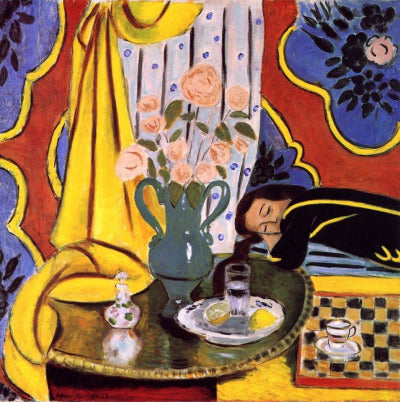Description
In the work "Harmony in Yellow," created by Henri Matisse in 1927, a visual universe unfolds that summarizes the essence of the master's career. Matisse, one of the pioneers of Fauvism, distinguished himself by his bold use of color and his tireless pursuit of harmony, something that is clearly reflected in this piece.
The composition of "Harmony in Yellow" is rich in details and deeply evocative. The first element that captures the viewer's attention is, undoubtedly, the dominant color: a vibrant yellow that permeates the entire scene. This warm tone spills over the depicted room, generating an atmosphere of warmth and joy that is characteristic of Matisse's work.
In the center of the scene, we find a round table covered with a white tablecloth that echoes an elegant simplicity. On this table, there is a still life with fruits and flowers, arranged in an apparently casual but clearly calculated manner. The fruits and flowers not only add chromatic variety—with red, green, and blue tones that subtly contrast with the yellow background—but also contribute a sense of abundance and vitality.
In the background, a French-style chair can be distinguished in front of an open window, through which a sunlit coastal landscape can be glimpsed. This introduces an element of connection between the interior space and the exterior world, a frequent duality in Matisse's works. The view of the sea highlights the artist's passion for Mediterranean landscapes, a constant source of inspiration in his career.
The balance and harmony in the arrangement of the elements are a testament to Matisse's mastery of composition. Every object in the scene seems to have its predestined place, contributing together to a sense of total unity. Additionally, the use of curved and soft lines adds a sense of fluidity and movement, creating a visual choreography that guides the viewer's gaze from one point to another.
It is worth noting that "Harmony in Yellow" is part of a series of works where Matisse explores the relationship between color and form. His masterful technique for creating spaces where color is not merely an attribute but the protagonist is evident here. The saturation of yellow not only unifies the elements of the painting but also serves as a vehicle to convey emotions and sensations, leading the viewer to experience the liveliness and sensory pleasure that characterize Matisse's work.
In summary, "Harmony in Yellow" is a celebration of life and color, a testament to Henri Matisse's unique talent for capturing the essence of his surroundings and transforming it into an impactful and enduring visual experience. The painting not only reveals Matisse's technical mastery but also invites us to immerse ourselves in a world where harmony and beauty are omnipresent.

